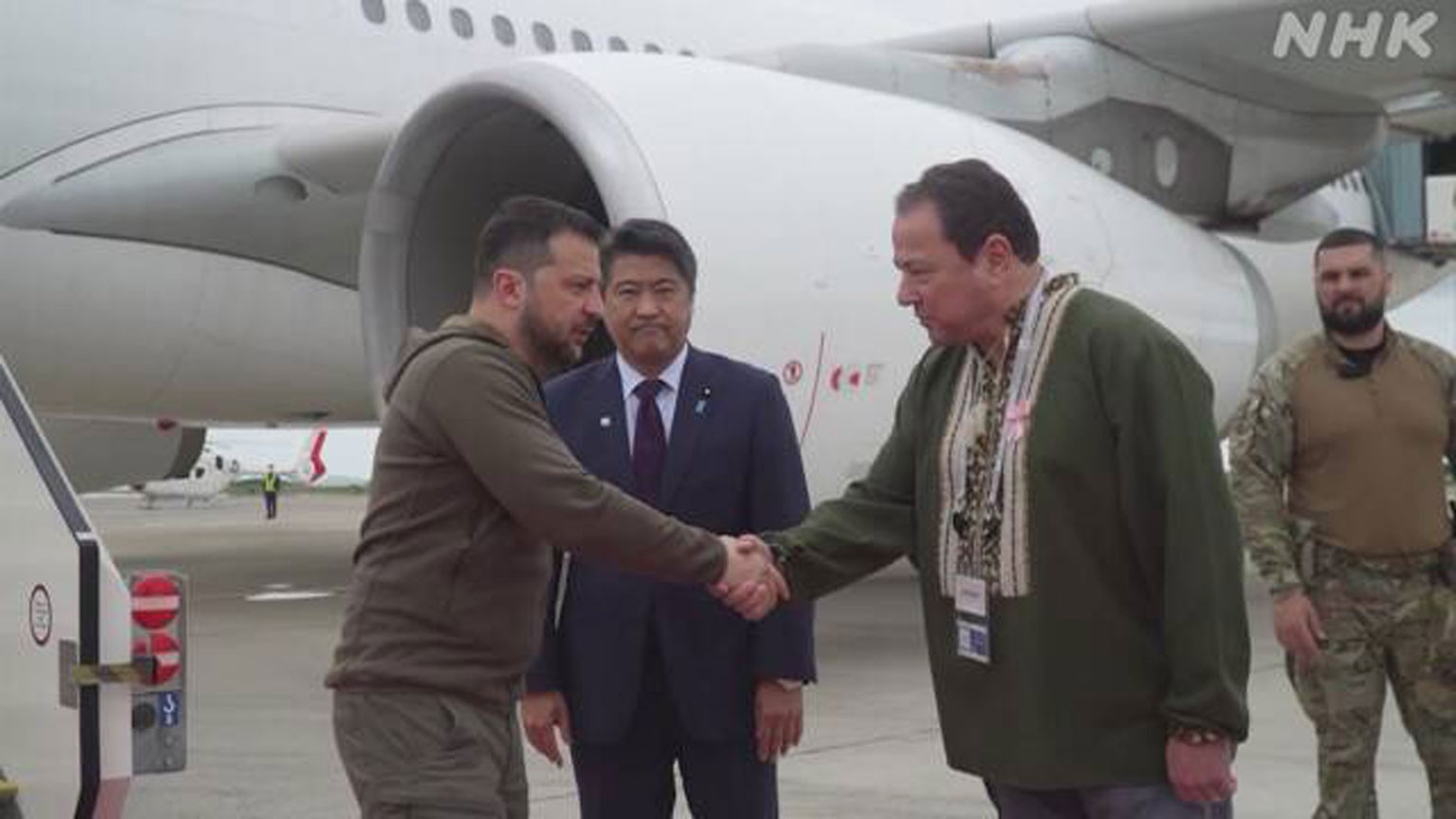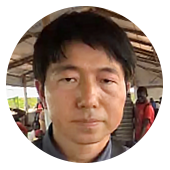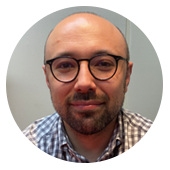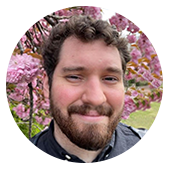Mitamura Taro: Thank you so much, Mr. Ambassador. I was also at the summit and saw you welcome President Zelenskyy and shake hands with him at the airport. How did it feel to welcome him to Hiroshima?
Sergiy Korsunsky: This is normal procedure that an ambassador meets with the president when he arrives on an official visit. It was difficult to organize. As you may guess, to see the president that far from home at the time of war — this is a big challenge and a big opportunity. So, we tried to use every moment of his presence in Hiroshima to continue our efforts to mobilize support to Ukraine.

Mitamura: I think many people were kind of impressed that the president didn't wear his typical khaki green shirt (to the memorial). Instead, he wore a black shirt with the word "Ukraine" on the front. Why do you think he did that?
Korsunsky: I couldn't tell you. I honestly don't see any specific message in that. He uses this special brand created during the war by a Ukrainian company. As you guess, he's trying to underline that we are at war. It's not the time for formal dress and formal considerations. He devotes all his time to the efforts to mobilize support to Ukraine. But I cannot tell you details I don't know.

Mitamura: I thought it could also be a way of paying tribute to the atomic bomb's victims and survivors.
Korsunsky: It's quite possible, but much more important is that he paid tribute to the victims of Hiroshima in his heart.
He was very moved by a visit to the museum. If you listen to his speech — which we translated into Japanese and posted on his official website so every citizen of Japan can read it and see his message — he specifically refers to the museum and to what he had seen.
I've been to the museum, of course. It's an image which you cannot forget, and it's another confirmation that we should do everything possible in our activities as diplomats, as politicians, to prevent any possibility of repetition of such a tragedy.
Mitamura: In his speech, he especially referenced the "Human Shadow Etched in Stone." Why do you think he mentioned that?
Korsunsky: Because it is terrible to see this artifact from the bombardment. It is absolutely stunning to see that, just minutes ago, that was a human being and after the explosion you have just a shadow of this person imprinted on the stone. It is truly a stunning impression of nuclear power if used as a weapon.
Mitamura: President Zelenskyy also said that when he saw photos of Hiroshima's devastation, it reminded him of the city of Bakhmut. Why do you think he said that?
Korsunsky: You can see videos of the city of Bakhmut from before the war. It was a small city, 72,000 people, but it was very nice. Very peaceful. It was famous for producing two things. Salt and champagne-style wine.
After seven months of fighting with Russian forces, the city was completely destroyed. Emptied of people. For what? The Russians call it liberation. It's nonsense.
The Battle of Bakhmut in the days of (Zelenskyy's) visit to Hiroshima was very fierce. And when you see the destruction in Hiroshima you see a similarity.
Mitamura: President Zelenskyy also met with atomic bomb survivor — so-called hibakusha. What was that like for him?
Korsunsky: I can tell you it is very painful, touching, and deeply disturbing to listen to their memories of those difficult years. So, I think he was moved.
Mitamura: How successful was this trip to Hiroshima for the President and Ukraine?
Korsunsky: (We had) 11 meetings, bilateral meetings, two big important sessions, the memorial visit, a speech addressing the Japanese people — and all of this in a very short period of time. I think, from any point of view, the visit was extremely successful.
To talk to people, to leaders of developed countries and leaders of the "Global South" personally is extremely important. You can look into their eyes. Feel what they think, and what their attitude toward the conflict is, and bring our simple message — that no one in the world wants peace more than Ukraine.
But this peace cannot be established by bargaining with the aggressor. It should be established in a very simple manner. Russia should withdraw its troops. It must respect Ukrainian sovereignty and territorial integrity. And — Russia must pay, in financial terms and in legal terms, for what they have done.
Mitamura: How important was it for President Zelenskyy to meet with India's Prime Minister Narendra Modi?
Korsunsky: It was very important, because India is one of the leading voices of the "Global South." Prime Minister Modi has exercised much effort to present a vision of post-colonial developing countries.
As you know, India is now chairing the G20. Several G20 ministers' meetings before the (G7) summit in Hiroshima were unsuccessful because of differing positions between of the 18 countries and two of them — China and Russia.
It was important for India's prime minister to see and understand our position, to hear from President Zelenskyy, and take that into account in preparation for the G20 summit.

Mitamura: The President chose to come all this way to Japan, despite safety concerns with the ongoing war. Why is Japan so important for him and Ukraine?
Korsunsky: Firstly, with Japan's leadership in organizing the G7, it was important to talk to the leaders, personally and all together, on contributing to strengthening support for Ukraine.
Second, it was important to talk to countries beyond the G7 plus European Union. There was a thorough list of invited guests — India, Indonesia, Vietnam, South Korea, and leaders of forums of African countries and Pacific Islands. We don't have many opportunities to talk to them, and that's why it was important to participate in the extended session and present our viewpoint.

But it was equally important to continue our bilateral dialogue (with Japan). Prime Minister Kishida Fumio visited Ukraine earlier this year. We believe that we must have much more comprehensive dialogue as we are now preparing for our reconstruction phase after we achieve victory. No country in the world has birthed better and more thorough experience in reconstruction efforts — different kinds of reconstruction efforts — than Japan.
Beginning one hundred years ago with the earthquake in Tokyo in 1923, as well as the Second World War, Japan has — several times — experienced massive devastation to its cities' infrastructure, and the loss of industrial power and people. Each time, Japan was able to restart its economy, to regain strength. The force and knowledge of Japanese society was able to make Japan a leader of the economic world and soft superpower. We want this.
As well, we still need the support of our partners in supplying our military forces with proper equipment. We understand restrictions existing in Japan on providing lethal weapons. But — Japan has a lot of non-lethal equipment, which can be helpful. There are (Japanese) trucks that will soon be transferred to Ukraine, as well as 30,000 "ready to eat" meals for the army.
For the first time ever, Japan will accept our wounded soldiers — ones with amputations — for treatment and rehabilitation at a Self Defense Forces hospital. I should mention that some of our soldiers have already been treated at private clinics in Japan, with very successful results. Japanese doctors did miracles.
We believe that is important for Japan, too, because treating battlefield wounds is a completely different story from treating everyday injuries. It is better to have this experience and doctors would know what to do when you have multiple cases of trauma.
During the meeting with (Japan's) Prime Minister, there was also a very comprehensive discussion of future assistance. We very much hope that after the upcoming London conference, we will organize a conference for reconstruction in Ukraine in Japan, in participation with companies from Japan, Ukraine and other countries.
We do need a strong, powerful package of projects prepared for when there is a ceasefire established in Ukraine. We want to rebuild and modernize our infrastructure as quickly as possible. Japan should be a leading force in it.



